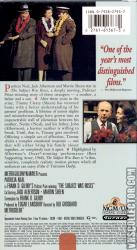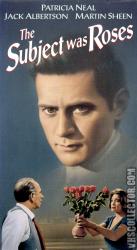The Subject Was Roses
Catalog Number
M201367
-
Primary Distributor (If not listed, select "OTHER")
Catalog Number
M201367
Primary Distributor (If not listed, select "OTHER")
Release Year
Country
N/A (NTSC)
N/A | N/A | N/A
N/A | N/A
The Subject Was Roses (1968)
Additional Information
Additional Information
The Story of Three Strangers...A Mother...A Father...And a Son
Frank D. Gilroy's Pulitzer-winning "kitchen sink" theatrical piece The Subject Was Roses was given a no-frills film transference in 1968. Martin Sheen and Jack Albertson re-create their stage roles as a returning serviceman and his alcoholic father. Patricia Neal takes over from the play's Irene Dailey as Nettie Cleary, Timmy's (Sheen) overly protective mother, long at odds with husband John (Albertson) over his drinking. Mother and Father try to put on a facade of happiness for the benefit of their son, but soon the three of them are squabbling again, just as if the boy had never been away. With the exception of adding a few extraneous characters, the film version of The Subject Was Roses is essentially the same as its 1964 Broadway counterpart. The film helped establish the career of Martin Sheen, launched a whole new dramatic career for Jack Albertson, and represented a triumphant comeback for Patricia Neal, who'd recently recovered from a debilitating stroke. ~
Vincent Canby of the New York Times called the film "one of those . . . middle-class domestic dramas that — for various reasons — time has passed by, as it has the Philco Playhouse . . . The play has been brought to the screen with flat, fatal fidelity by Mr. Gilroy . . . Quite awkwardly (since it makes you aware of everything else you are not seeing), the one-set play has been opened up with several excursions outside the Bronx apartment. What's worse, Mr. Grosbard has retained the Broadway pace, which is particularly evident in the performances of Mr. Albertson and Mr. Sheen . . . The tempo of the acting often seems to be outrunning the movie itself . . . Miss Neal's presence . . . gives the movie an emotional impact it wouldn't otherwise have . . . She has, in fact, simply too much style and wit for this kind of monosyllabic nonsense." [4]
Roger Ebert of the Chicago Sun-Times thought Gilroy's "extraordinary play . . . has been filmed with the greatest care, but it fails as a movie. It is hard to say exactly why. There's nothing obviously wrong, but when you walk out you don't feel as if you've been there. Something was missing." He added, "Part of the problem is with the actors, I think . . . Albertson and Sheen . . . talk loudly, their movements are too obvious, they are trying to project . . . Miss Neal, who knows the movies, is better suited to the medium. She holds back, she suggests more than she reveals, and when all three actors are on camera her performance makes the other two look embarrassingly theatrical. And there is where the movie fails." [5]
Variety said, "The terrific writing, which top-notch performances make more magnificent, displays a wide range of human emotions, without recourse to cheap sensationalism or dialog. Grosbard's perceptive direction keeps the bickering and banter from becoming shrill histrionics." [6]
TV Guide rated the film four stars, citing "the terrific acting, sharp writing, and outstanding direction from Grosbard" and adding, "Never does the emotion explode into oratory, so almost every scene has an underlying tension that continues to bubble.
Release Date: October 13, 1968 @ The Plaza
Distrib: United Artists
Frank D. Gilroy's Pulitzer-winning "kitchen sink" theatrical piece The Subject Was Roses was given a no-frills film transference in 1968. Martin Sheen and Jack Albertson re-create their stage roles as a returning serviceman and his alcoholic father. Patricia Neal takes over from the play's Irene Dailey as Nettie Cleary, Timmy's (Sheen) overly protective mother, long at odds with husband John (Albertson) over his drinking. Mother and Father try to put on a facade of happiness for the benefit of their son, but soon the three of them are squabbling again, just as if the boy had never been away. With the exception of adding a few extraneous characters, the film version of The Subject Was Roses is essentially the same as its 1964 Broadway counterpart. The film helped establish the career of Martin Sheen, launched a whole new dramatic career for Jack Albertson, and represented a triumphant comeback for Patricia Neal, who'd recently recovered from a debilitating stroke. ~
Vincent Canby of the New York Times called the film "one of those . . . middle-class domestic dramas that — for various reasons — time has passed by, as it has the Philco Playhouse . . . The play has been brought to the screen with flat, fatal fidelity by Mr. Gilroy . . . Quite awkwardly (since it makes you aware of everything else you are not seeing), the one-set play has been opened up with several excursions outside the Bronx apartment. What's worse, Mr. Grosbard has retained the Broadway pace, which is particularly evident in the performances of Mr. Albertson and Mr. Sheen . . . The tempo of the acting often seems to be outrunning the movie itself . . . Miss Neal's presence . . . gives the movie an emotional impact it wouldn't otherwise have . . . She has, in fact, simply too much style and wit for this kind of monosyllabic nonsense." [4]
Roger Ebert of the Chicago Sun-Times thought Gilroy's "extraordinary play . . . has been filmed with the greatest care, but it fails as a movie. It is hard to say exactly why. There's nothing obviously wrong, but when you walk out you don't feel as if you've been there. Something was missing." He added, "Part of the problem is with the actors, I think . . . Albertson and Sheen . . . talk loudly, their movements are too obvious, they are trying to project . . . Miss Neal, who knows the movies, is better suited to the medium. She holds back, she suggests more than she reveals, and when all three actors are on camera her performance makes the other two look embarrassingly theatrical. And there is where the movie fails." [5]
Variety said, "The terrific writing, which top-notch performances make more magnificent, displays a wide range of human emotions, without recourse to cheap sensationalism or dialog. Grosbard's perceptive direction keeps the bickering and banter from becoming shrill histrionics." [6]
TV Guide rated the film four stars, citing "the terrific acting, sharp writing, and outstanding direction from Grosbard" and adding, "Never does the emotion explode into oratory, so almost every scene has an underlying tension that continues to bubble.
Release Date: October 13, 1968 @ The Plaza
Distrib: United Artists






Comments0
Login / Register to post comments